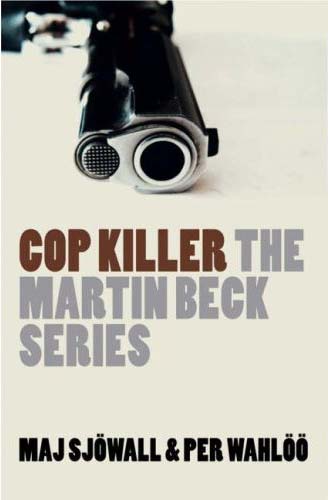
EURO CRIME
Reviews

Sjowall, Maj and Wahloo, Per - 'Cop Killer' (translated by Thomas Teal)
Paperback: 288 pages (Dec. 2007) Publisher: HarperPerennial ISBN: 0007242999
Although written in the 1970s, this ninth volume in the Martin Beck series remains a strong, relevant novel today. Two stories are told, both sent in the Malmo region of Sweden. In one, a woman vanishes, last seen waiting at a bus stop (making me wonder if Colin Dexter's first Inspector Morse novel was a slight homage?). Martin, now chief of the National Murder Squad, is bought in to investigate. The interactions between Martin and the local officer, Herrgot Allwright, are a delight, with the two very different personalities sparking off each other in many telling and dryly humourous ways (I wonder how the puns about Allwright's name being equivalent to "all right" were so cleverly rendered into English by Thomas Teal, the translator?).
The second main investigation involves the titular "cop killer" - an incident in which two youths in a stolen car are apprehended by a police patrol car because of the unnatural enthusiasm of the young recruit at the wheel while the two older constables are indulging in their usual activity of sleeping and avoiding all the calls on the police radio. Disaster ensues when the recruit pulls out his pistol: one of the youths shoots blindly, resulting in two deaths and two hospitalisations. The other youth, who had stayed frozen in the car throughout, drives off - and a manhunt ensues for this "cop killer", as he is inaccurately dubbed by the press.
The two investigations continue pretty much separately, and are told in the characteristic measured, unvarnished style of these authors. At the same time, the narrative is laced with many observations about the failure of the Swedish welfare state and the degeneration of society. The media come in for their fair share of authorial scorn, of course, as does Martin's boss, the awful National Police Commissioner Malm, here as in previous books disastrously directing operations and making over-hasty decisions, to the detriment of the men he leads as well as to justice.
Martin's investigation of the missing woman soon identifies a prime suspect, whom Malm forces Martin to arrest. Martin is not satisfied, however, so continues delving into the woman's life, revealing hidden layers. The "cop killer" search continues, with the youth eventually hanging out with the "Breadman", a rogue who is the subject of a hilarious stakeout in the opening chapter. Will the police catch up with him? A whacking coincidence leads to the two investigations converging. In both cases we are shown two pathways: the official route to a solution (any solution); and the old-fashioned methods the detectives use, in which their experience, as opposed to training courses and manuals, shows how to apprehend and detain a suspect somewhat more effectively.
Many characters from previous novels in the series appear in COP KILLER: police, criminals and victims. Although the book can be read as a stand-alone, it is worth reading the series in order to appreciate the ironies and full effect of many of these encounters or tales. I continue to be extremely impressed with this very readable and insightful set of novels. I am torn between eagerness to read the next in the series, and a desire to wait - because I know that the next one is the last.
Maxine Clarke, England
August 2010
Details of the author's other books with links to reviews can be found on the Books page.
More European crime fiction reviews can be found on the Reviews page.